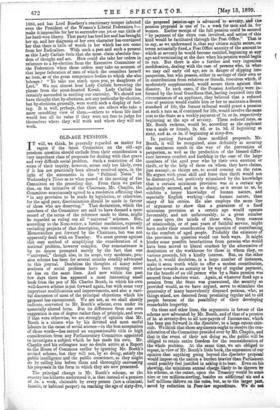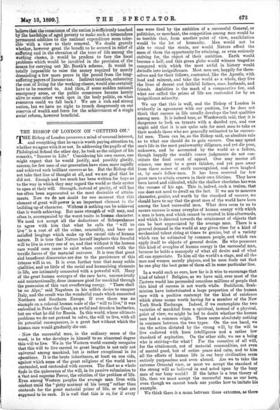OLD-AGE PENSIONS.
IT will, we think, be generally regarded as matter for regret if the latest Committee on the old - age rgret pensions question should exclude from their consideration a very important class of proposals for dealing with that grave and very difficult social problem. Such a restriction of the scope of their inquiry, however, seems only too likely, even if it has not practically been already resolved upon, in the light of the statements in the " Political Notes " in Wednesday's Times as to what passed at the meeting of the Committee on the preceding day. From them we gather that, on the initiative of the Chairman, Mr. Chaplin, the Committee unanimously agreed to a resolution affirming that " in any provision to be made by legislation, or otherwise, for, the aged poor, discrimination should be made in favour of .those who are deserving." That declaration, which the members of the Committee are said to have deemed a mere record of the terms of the reference made to them, might be regarded as ruling out all " universal ". schemes. But, according to the Note-writer, a further resolution, expressly excluding projects of that description, was contained in the Memorandum put forward by the Chairman, but *was not apparently dealt with on Tuesday.. We must protest against this easy method of simplifying the consideration of a national problem, however complex. Our remonstrance is by, no means prompted merely by the fact that one " universal," though also, in its scope, very moderate, pen- sion scheme has been for several months steadily advocated in this journal. Doubtless the thoughts of many sober students of social problems have been running more or less on the same lines. And now within the past few days there has appeared a most interesting small book from the pen of Mr. Charles Booth, in which his own well-known scheme is put forward again, but with some very important modifications and improvements, and also a care- ful discussion of most of the principal objections which his proposal has encountered. We are not, as we shall shortly indicate, converted to Mr. Booth's scheme, even under its materially altered form. But its difference from our own iuggestion is one of degree rather than of principle, and even if that were otherwise, we are strongly of opinion that Mr. Booth is a citizen who by his devoted and most useful labours in the cause of social science—in the best acceptation Of. those words—has earned an unquestionable title to high consideration from any Parliamentary Committee appointed to investigate a subject which he has made his own. Mr. Chaplin and his colleagues may no doubt arrive at a Report to the House of Commons earlier by ignoring 'Mr. Booth's revised scheme, but they will not, by so doing, satisfy the public intelligence and the public conscience, as they might do by calling him before them and thoroughly canvassing his proposals in the form in which they are now presented. . , The principal change in Mr. Booth's scheme, as the country has hitherto understood it, is that instead of a pension, of. 5s. a week, claimable by every person (not a criminal,- lunatic, or habitual 'pauper) on reaching the age of sixty-five, the proposed pension-age is advanced:.to seventy, sad the, pension proposed is one • of 7s. a week for men and 5s. for women. Earlier receipt of the full.pensiOn could be secured " by payment of the extra cost involved, and action of this kind would be facilitated through the post Office." That is to say, as we understand it, that any citizen might secure, on terms actuarially fixed, a Post Office annuity of the amount to which at seventy he would become entitled, beginning at any age and terminating at the date when his pension would begin to run. But there is also a further and very ingenious modification, dealing with the case of persons who, 'in "what+ we may call early old age, are in danger of slipping into pauperism, but who possess, either in savings of their own or in contributions from relatives or friends, resources :which, if moderately supplemented, would secure them . against that disaster. such cases, if the Pension Authority. Were formed by the local Guardians that, having inquired into the circumstances of an applicant, they believed that a reduced rate of pension would enable him or her to maintain a decent. Standard of life, former tribunal would grant a pension, at such a rate as, if continued for life, would involve the same cost to the State as a weekly payment of 7s. or 5s. respectively- beginning at the age of seventy. These reduced rates, as Mr. Booth reckons, would be, according as the applicant• was a male or female, 2s. 6d. or ls. 9d. if beginning at sixty, and 4s. or 3s. if beginning at sixty-five. • In putting forward these modified proposals, Mr.. Booth, it will be recognised, aims definitely at securing the maximum result in the way of the prevention• of pauperism, as well as the production of the blessed differ- ence between comfort and hardship 'in the case .of the large numbers of the aged poor who by their own exertion or thrift, or by the help of those on whom they have claims, just manage, as things are, to avoid coming on the. rates. He argues with great skill and force that thrift would not be discouraged, but positively stimulated by the knowledge that a certain minimum 'provision was at a certain age absolutely secured, and in so doing, as it seems to us, he exhibits a larger knowledge of human 'nature, and especially English working - class human nature, than many of his critics. He also employs the same line of 'argument to .show that a guarantee of ,a fixed' minimum provision at a certain age would operate i favourably, and not unfavourably, in a great number of cases upon the minds of those who, from reasons of relationship, or of past years of faithful service, might' have under their consideration the question of• contributing,' to the comfOrt of aged people. ' Probably' the existence of the provision in question would cut both ways. It might hinder some' possible benefactions from persons who would have been moved to liberal conduct by the alternative of destitution or the workhouse for those in whom they, on various grounds; felt a' kindly' interest. But, on the other hand, it would doubtless, in a large number of instances, make it seem worth while • to offer a modest contribution, whether towards an annuity or by way of regular payment; for the benefit of an 'old person who by a 'State pension ,was' secured from absolute want. Again, at whatever fixed age-a pension from the State was guaranteed, the security so provided would, as we have argued, serve to stimulate the generosity of many benevolently disposed persons, 'who; as things stand, are deterred from promising regular aid to old people because of the possibility of their developing remarkable longevity.
On these and other lines, the arguments in favour of the scheme now advocated by Mr. Booth, and of that of a pension of 5s. at seventy-five to all non-payers of Incoine-tax, which' has been put forward in the Spectator, to a largetztent coin- cide. We think that those arguments ought to receive the con- sideration of the Committee presided over by Mr. Chaplin, and that in the event of their not doing so, the public will be obliged to retain entire freedom for the " reconsideration of the whole problem. At the same time, we are obliged to repeat, in view of Mr. Booth's little book, the expression' of our' opinion that anything going beyond theSpeelator prop.c441 would impose on the nation a burden heavier than Parliament could. possibly-feel justified in asking it to bear. Even on his showing,' the minimum annual charge likely to be thrown by his scheme, at the outset, upon the Treasury would be some nine or ten millions sterling,-besides an additional' six and a half millions thibwii on the rates; but, as to the larger part, saved by reduction in Poor-law expenditure. We ' do not believe that, the conscience, of the nation iseufficiently touched by the hardships of aged poverty to make such a tremendous permanent addition to the national expenditure seem toler- able 'with a view • to their removal._ We doubt gravely whether, however great the benefit to be secured in relief of suffering and in the elevation of the tone of life among the Working clades, it would be prudent to face the fiscal problems which would be involved in the provision of the means for carrying out Mr. Booth's scheme.. It would be totally impossible to raise the money required by merely demanding. a few more pence in the pound from the long- suffering payers of Income-tax. Indirect taxation, enhancing the cost of living for the working classes, would also certainly have to be resorted to. And then, if some sudden national emergency arose, or the public conscience became keenly alive. to some,other weak, spot in the body politic, on what resources could we fall back ? We are a rich and strong nation, but we have no right to trench dangerously on our reserves of wealth and force for the achievement of a single social reform, however beneficial.







































 Previous page
Previous page